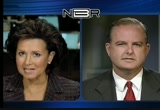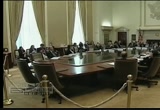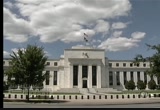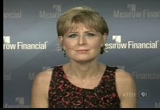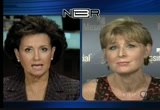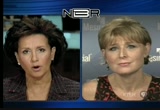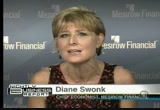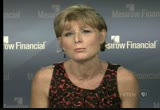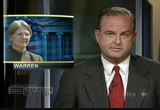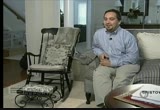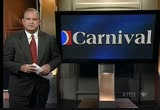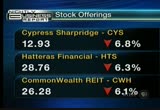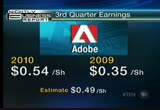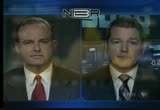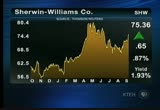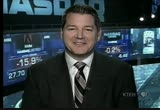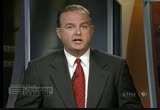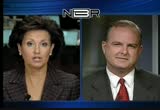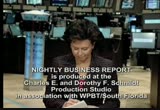tv Nightly Business Report PBS September 21, 2010 6:30pm-7:00pm PDT
6:30 pm
>> susie: with the economy plodding along, the fed holds rates steady, but says it's ready to act. >> if fears of deflation start building in the economy, the fed will feel forced to move. and, they should. >> jeff: but with just two meetings left this year, fed chief bernanke and company could be pressed for time. you're watching "nightly business report" for tuesday, september 21. this is "nightly business report" with susie gharib and tom hudson. "nightly business report" is made possible by:
6:31 pm
this program is made possible by contributions to your pbs station from viewers like you. captioning sponsored by wpbt >> susie: good evening everyone, tom hudson is on assignment. jeff yastine joins us. the federal reserve kept its key interest rate at zero, but said it's ready to take action to boost the economy when the time is right. that announcement came today as the fed wrapped up its policy meeting in washington. susie, one thing that stood out at this meeting is the fed is getting more worried about inflation. the problem is, inflation is too low, and below what the fed considers acceptable. >> susie: that could be the catalyst for the fed to pump more money into the economy. so what will the central bank do
6:32 pm
next? suzanne pratt reports. >> reporter: two more meetings. one two-day event in early november, the other in mid december. that's the window the fed has left this year to boost the economy. but, whether the central bank eases monetary policy in the next few months depends on what happens with the economy. and, fed watcher dana saporta says it's clear now that policymakers have linked their next move to inflation, or more specifically, the lack of it. >> i think the fed is loath to use the d-word, deflation. but, that's what they're talking about. if fears of deflation start building in the economy, the fed will feel forced to move. and, they should. >> reporter: most economists agree the fed's next move will be asset purchases. u.s. treasuries are the most likely contender. in march, the fed completed a shopping spree for nearly $2 trillion in government bonds and mortgage securities. some economists speculate as much as another $0.5 trillion in
6:33 pm
treasuries will be needed this time. the goal is to push interest rates even lower, and spur growth. >> unfortunately, the fed can't directly create jobs. the fed cannot directly make people spend money. so, the best tool they have is the interest rate tool. we know they can get interest rates lower, they have done a great job of that so far. >> reporter: still, the timing of such a move is up for some debate. economist drew matus predicts the fed won't need to buy extra assets, because he believes the economy will improve. if he's wrong, however, he's got a longer timetable for the purchases. >> i wouldn't look for it in november, if you look for it any time. i think in the current environment, easing the day after an election is not going to win the fed any friends. so, i think they would avoid making that action then. i think if you're looking for quantitative easing, you should probably be looking for december now. of course, fed policymakers can always take action to spur growth between meetings.
6:34 pm
but, experts say such moves are extremely rare and would only happen if the economy took a serious turn for the worst. suzanne pratt, "nightly business report," new york. >> susie: president obama is losing another key player in his economic team. national economic council director lawrence summers says he will leave his post after november's mid-term election. he plans to return to teaching at harvard. joining us now for more analysis on the president's economic team and today's fed meeting, diane swonk, chief economist at mesirow financial. hi, diane. >> hi. >> susie: let's start off talking about the fed first. what is the fed waiting for? how bad do things have to get for the fed to take some action to boost the economy? >> really, the fed doesn't have to see things get a lot worse, but they have to see things not improve. the economy has deteriorated over the summer, they need to see the economy reaccelerate,
6:35 pm
and if it doesn't reaccelrate fast enough, the fed will act. we se need to see another bad report, and the inflation rate closer to zero. and i don't think treasury bonds would be the only thing they could buy. they can buy mortgag mortgage-backed securities, and since the housing market is still bad. >> susie: let's say that the fed takes action in the way you're talking about, pumping more money into the economy. will it make a difference? will businesses borrow more, spend more, and hire more? will it make a difference? >> nobody knows for sure. we're in uncharted territory. many within the fed system don't think it will make a difference. and there are others who think if it makes 3/10s
6:36 pm
in a economy that is only go 1%, that's a lot. in that perspective, that's where the chairman is coming from, and he is looking to make even a little difference. if he can make even a little dent in the dmee, that is some progress. and they're mandated by law to try to bring inflation up from what it is at and bring the unemployment rate down. >> susie: whether you're in business or an american out of work, everybody wants somebody to fix the economy. the question is: has the fed gotten to a point where it really can't do much more? and it's going to be up to the government or some other place? >> well, it is interesting how we -- we don't really want our government in our business, but we want them to fix the economy. that's the paradigm we're in. who is the fed chairman who said he would be willing to drop money from helicopters if he had to. that is still a possibility out there. this is the man who invented bullets out of thing air. i won't take my money off
6:37 pm
ben bernanke. >> susie: let's talk a little about president obama's shrinking economic committee. christine roder has left and others. what does all of this mean in terms of economic policy going forward? >> i think what we're going to see is a real shift towards the middle in terms of although those were all excellent economists and i think very highly of them, but the administration needs to look more towards the business community. they need to give an olive branch to the business community. and the position that larry held was more often held by business leaders, and first held by bob ruben in the clinton administration than economists. so putting a business leader in there would not only be a an olive branch to the business world saying they're being heard, but also to the republicans
6:38 pm
having somebody who can message and communicate more, and try to do more cooperation on policy, rather than the lines and the sand drawn by both policies up noo until now. >> susie: if it is a business person, will the president really listen to him? will it make a difference besides just symbolic. >> i think absolutely. he has business support, and some are really angry with him at this time. some is policy, and some is the economy. i think he would listen to them. and it would give a better voice from the economy in the government, and how they approach policy and how they deal with policy in congress as well. >> susie: very interesting stuff. thank you so much, diane for coming on and sharing your thoughts with us. >> my pleasure. >> jeff: here are the stories in tonight's n.b.r. newswheel: stocks ended mixed after the fed hinted at further action to boost the economy: the dow rose
6:39 pm
seven points, the nasdaq fell six, the s&p 500 was off nearly three points. trading volume picked up from yesterday's levels on both the n.y.s.e. and the nasdaq. contractors broke ground on more homes in august, a lot more. housing starts rose a better- than-expected 10.5% percent last month, marking their biggest jump since november of 2009. with elizabeth warren now in charge of putting the consumer financial protection agency together, she's already getting down to business, today promising to simplify home mortgage paperwork. >> it's about how it is that we think about what information consumers need and when they need it to make the best possible financial decisions. and when we stay focused on that, i think we get to a place that works for american families, that works for the lending industry, and ultimately, that works for the american economy. >> jeff: still ahead, tonight's word on the street is housing.
6:40 pm
>> jeff: still ahead, tonight's "word on the street" is "housing." thestreet.com's bob walberg tells us why he thinks homebuilder stocks don't stack up. >> susie: here's more evidence of damage from the recession: about a quarter of americans now have credit scores that would label them a "poor risk." bad credit can be a problem when getting a mortgage, or a new credit card. but you might be surprised to learn it can also keep you from getting a job. jamila trindle reports. >> so here i am now for the third time in three years, basically laid off. >> reporter: rob mendez was laid off-- downsized-- and had a company go out of business. now the mendez family is putting the financial pieces back together. amy used to be a stay-at-home mom, but now she's working part time in the evenings at a children's store to help make ends meet, which means she hands off the kids to her husband in the afternoon. >> he gets here about 2:45, and i've got to be to work by 3:00, so i've got to tell him what the kids need-- if kaitlin's gone down for a nap... >> reporter: but they've come through the worst of it.
6:41 pm
>> not being able to pay credit cards on time, not being able to pay utilities, in florida our utilities were cut off because we couldn't pay at the time. we had to use up all of our savings, we had to try to make the house payments, keep the car, just everything that everybody would try to maintain as a whole. >> reporter: they eventually lost the car and sold the house in a short sale, and thought they'd found the answer when rob was offered an i.t. position with the government. he was up front about his credit history. >> i explained all this to them, and i said "is any of this going to be an issue?" and they said, "no, for this position we don't require a clearance, and it's not a financial position so you don't have to worry about that." >> reporter: so mendez was surprised when his job offer was revoked. that's when mendez reached out to david price, a lawyer who helps clients all over the world get through the government
6:42 pm
hiring process. >> it clearly was one of those situations where you had an individual who had been doing everything right. he was very responsible, his job performance was exceptional, as was evidenced by the jobs that he had been hired into. >> reporter: price says the government is supposed to take into account circumstances like the mendez family found themselves in. >> things like loss of employment or illness or divorce, they say that on paper, but when it comes to putting it into practice, the government gives no real consideration to the reality of what the broader economy has done to individuals. >> reporter: the government has a particularly rigid hiring process, but the use of credit reports in hiring is now quite common in the private sector. in one survey, nearly half of employers said they used it some of the time and 13% said they used it all of the time. a credit report reveals an individuals' financial history. but, is it a good predictor of whether a person is going to be a good worker?
6:43 pm
it depends what kind of work. elizabeth owens bille, of the society of human resources management, says credit checks are necessary for some positions. >> for those financial jobs, for senior executive positions, like the c.e.o., for the h.r. department, for people who have access to the sensitive employee information. >> reporter: at a hearing on capitol hill later this week, legislators are looking at restricting the types of jobs for which an employer can pull a credit report, to try to make sure the recession's credit problems don't keep people from getting jobs. >> we're just dealing with a lot of different types of financial situations that we never thought in a million years we would have to deal with. >> reporter: jamila trindle, "nightly business report," bristow, virginia.
6:44 pm
>> jeff: so the fed signals that it could soon be time for quantitative easing-- part two. and it was bond prices that go on a tear, with stocks fading away. buyers of bonds just couldn't get enough, once the fed signaled its growing worries about deflation pressures. look at this chart. this shows the yield-- the interest rate-- on the two-year treasury note: a new record low of o.4%. the 10s and 30s also saw lots of buying, although yields aren't anywhere close to setting new lows.
6:45 pm
as for stocks, a rush for the exits in the last hour. but, transportation stocks managed to hold their gains. let's look at the dow transports e.t.f. in the face of today's selloff, it managed to set a new four- month high. the airlines-- continental, delta, and american airlines-- leading the way. some of that may be due to an industry trade report yesterday predicting a tripling in profits for carriers globally this year, before a big drop in 2011. investors giving a lukewarm reception to a cautious outlook from carnival cruise lines. the company said lower fuel costs and more revenue per passenger helped its seasonally strongest quarter, but carnival sees lower occupancies for the wintertime caribbean voyages. that's going to hurt four quarter numbers. here is a one year chart of carnival. the stock climbed to a four- month high. but if you look at the quarter to date performance of the nation's number one and two cruiseliners, we see carnival up
6:46 pm
over 24%, while royal caribbean -- full steam ahead. the shares gaining nearly twice that percentage. with the markets hovering at four-month highs, what better time for a company to sell shares for cash? cypress sharpridge investments tumbling 6.75%, it sold 10 million shares in a secondary the reit will use the money to buy mortgage-backed securitiies. hatteras financial with a secondary offering of 6.5 million shares. that cash also earmarked for buying mortgages. commonwealth reit, with a five million share offering. they focus on commercial properties-- the cash will be used for paying down its debt. investors displayed an appetite to sell conagra foods. the stock dangling near a one month low on more than twice its average volume. here is a rundown of the packaged food maker's financials. first quarter earnings fell 12 percent-- missing estimates. management blamed high commodity prices and intense competition with its arch rival nestle. a company like conagra might
6:47 pm
turn to promoting its products with consumers more, but so far its not having much effect. the one plus for investors, conagra boosted its quarterly dividend to 23 cents a share-- a gain of 15%. and if you own shares in adobe systems, the shares are off about 14% in after-hours trading. its latest profit report was fine, but the company forecast weaker revenues for the fourth quarter. sales of adobe's latest version of creative suite appear to be slowing. ad agencies and other big buyers of adobe products are holding off on purchases while they see how the economy does. and as you can see, the stock has had a nice run from its lows in june. and that's tonight's market focus.
6:48 pm
>> jeff: there are few sectors in the stock market as beaten-up as housing. pessimism reigns supreme. but, that might present some interesting investing opportunities. that's the focus of tonight's "word on the street." robert walberg, chief market strategist at thestreet.com joins us with more. bob, welcome back to "nightly business report." >> good to be here, jeff. thank you. >> jeff: when we talk about investing in the housing sector, the first instincts is to think about buying the home builder stocks themselves. we'll bring up the s&p home builders e.f.f. would you buy the home builder's stocks now? >> i would not. they've had better than
6:49 pm
expected earnings earlier than the week, but i would see it as a short-term temporary move and selling into those gains. >> jeff: if you don't buy the home builders, what do you buy. what is the first? >> you buy the home improvement stocks. people will be staying in their homes or buying new ones, and that is good news for stocks like home depot. home depot is the largest in the do-it-yourself improvement sector, and same-store sales are on the rise. a good value to be. and sherwin williams. your painting provider, one of the leading providers of paint in the country. the stocks had nice momentum, around $75 share, just about to break to new highs, and, again, about a 2% dividend yield. and finally, i think you can buy another home improvement country, masco, provides everything from kitchen cabinets to plumbing. 2.6% dividend yield, and
6:50 pm
again coming off of its bottom, a nice turnaround story with the stock going from 11 to the 15 area. >> jeff: the sherwin williams, they're in the middle of what seems to be an acquisition campaign. they've done three or four pretty decent-sized acquisitions, and i presume that is part of why the stock -- if we look at a multi-year chart, you would see that the stock, as you mentioned, is about to break to new highs. >> showing very strong momentum, consolidating its position in the market, gaining market share, and looking to be a very strong player domestically and internationally. sher rin williams is a relatively safe place to be. stock around 21%, 22% year-to-date. if we can break above the $80 a share level, i think it has legs in the 92, 95 area. >> jeff: could it be affected since it sells paints, and one of the products is petroleum that goes into that -- could
6:51 pm
that be affected to the negative if the oil price continue to go high? >> it's in the modest consideration. what you're looking for is the strong demand for the end product, and the fact that sales growth is continuing in the 10% to 12% raise, and those are the factors that continue to drive the share price. >> jeff: bob, any disclosures to make on the stocks? >> i don't own any stocks. >> jeff: bob, thanks for joining us. bob walburg, and you can read his latest on thestreet.com. >> susie: here's what we're watching for tomorrow: treasury secretary timothy geithner goes to capitol hill to talk with a congressional committee about the international financial system. also, violent demonstrations like this one continue in greece, protesting labor reforms. we get an update on greece's economy and the challenges it faces, from prime minister george papandreou.
6:52 pm
>> susie: dallas mavericks owner mark cuban once again faces insider-trading charges. a federal appeals court today revived the securities and exchange commission's case against him. the s.e.c. says the dallas billionaire sold his shares in internet company mamma.com six years ago, after receiving confidential information. allegedly, that information let cuban avoid a $750,000 loss. cuban says he didn't break the law. >> jeff: no more text messaging for truckers. that's the gist of a new proposal by the transportation department. it specifically bans truck drivers from sending texts while hauling hazardous materials. the d.o.t. also wants to stop train operators from using cell phones and other electronic devices while on the job. the department is also pushing states to adopt tougher laws against texting while driving. fuqutuuuuuu
6:53 pm
>> susie: have you ever talked with a younger co-worker or perhaps one of your kids, and they just didn't get what you said? so has tonight's commentator. he's harry lin, c.e.o. of taaz.com, a silicon valley start-up, and he has some thoughts on modern metaphors. >> at work recently, i had cause to think about something that made me feel sort of old, or at least older.
6:54 pm
my team and i were discussing visual metaphors that we'd use on a web site to help convey meaning in a concise and visual way. you know, like on your mobile phone, there's an icon of a battery. except that your phone battery looks nothing like the battery icon, which probably resembles a duracell size d. what got me thinking about age, was that there are metaphors that reference things that younger folks don't know about. like the figure of speech, "you sound like a broken record." excuse me? a broken what? when it comes to technology, metaphors are critical. think windows, desktop, folders, web page, wall. without metaphors that reference physical things, technology would be even more confusing than it is. but our metaphors don't always resonate. that little envelope icon for e- mail? who sends letters anymore? a little old-timey handset meaning "phone?" phones nowadays are all just
6:55 pm
flat rectangles. and iconography such as film strips for movies or a panavision movie camera with those two big circular film reels on top-- what's a millenial kid today to make of those? however, there is a charming quaintness to metaphors that reference fading things. and as time goes on, those metaphors take on a meaning of their own, apart from what they originally referenced. and at that point, is it even a metaphor? well, at that point, we'll have chips embedded in our brains and we wont need those metaphors. you'll just think it, and it'll happen. i'm harry lin. >> jeff: that's right. i almost wrote that the other day. i said open the newspaper, when most of us don't really have a paper newspaper anymore. that's "nightly business report" for wednesday, september 21st. i'm jeff yastine. good night, everyone. good night to you, susie. >> susie: jeff, i hope you have a great evening. good night, everyone. we hope to see all of you again right here tomorrow night.
6:56 pm
"nightly business report" is made possible by: this program was made possible by contributions to your pbs station from viewers like you. captioning sponsored by wpbt captioned by media access group at wgbh access.wgbh.org >> more information about investing is available in "nightly business report's" video. >> be more. pbs.
164 Views
Uploaded by TV Archive on

 Live Music Archive
Live Music Archive Librivox Free Audio
Librivox Free Audio Metropolitan Museum
Metropolitan Museum Cleveland Museum of Art
Cleveland Museum of Art Internet Arcade
Internet Arcade Console Living Room
Console Living Room Books to Borrow
Books to Borrow Open Library
Open Library TV News
TV News Understanding 9/11
Understanding 9/11
